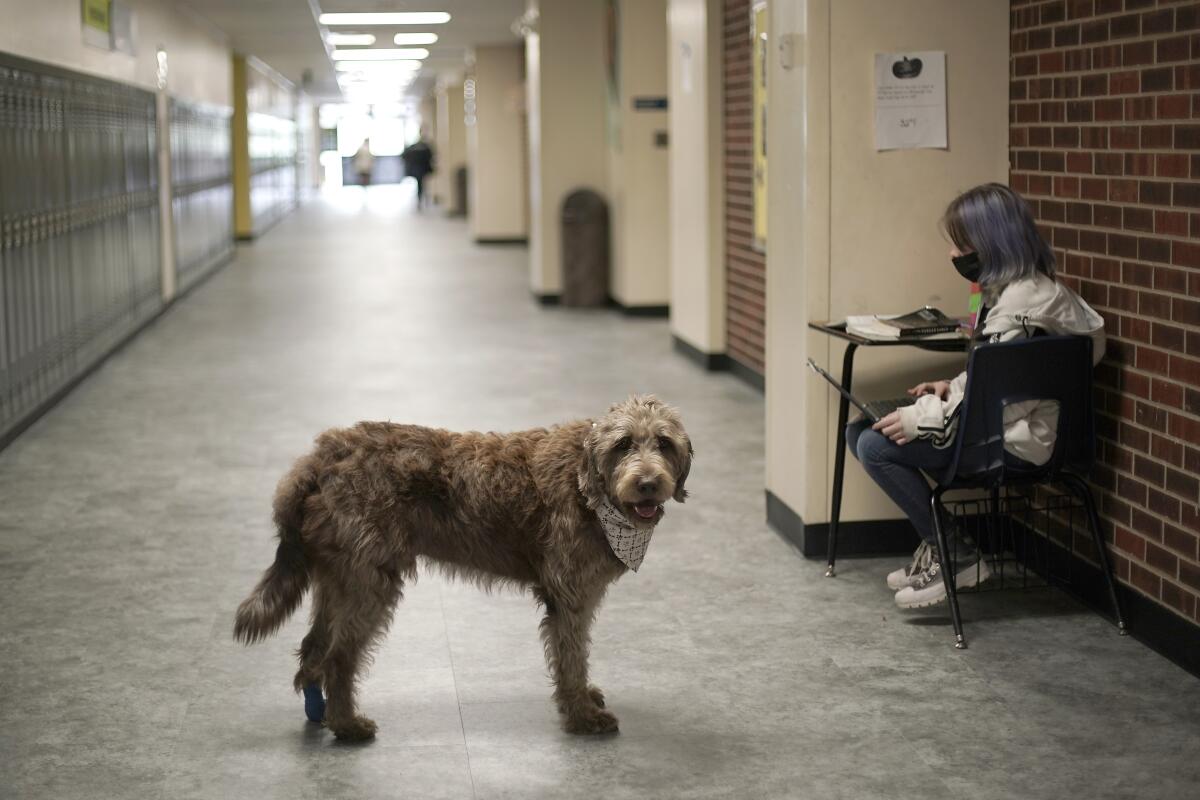Column: How worried should we be about the mental health of tween girls?

- Share via
Are today’s tween girls really more miserable than ever?
It sure seems like it.
By all indications, the incidence of depression and anxiety among all children has surged dramatically. In December, U.S. Surgeon General Vivek Murthy warned that the country is facing a youth mental health crisis, exacerbated by the pandemic. This followed the declaration of a national mental health emergency by the country’s leading experts in pediatric health, particularly among the most vulnerable — LGBTQ kids, disabled kids, Black, brown and Indigenous kids, and kids involved in the child welfare or juvenile justice systems.
This week, a psychologist suggested in a Washington Post essay that middle school girls are having the hardest time of all, especially since the pandemic.
“There is no shortage of possible causes,” wrote Jelena Kecmanovic, founding director of Arlington/DC Behavior Therapy Institute. “Overparenting, screens and social media, cutthroat academic and sports competition, political acrimony, social injustice, climate concerns, gun violence and virtual learning among others.”
Last year, the Centers for Disease Control and Prevention reported that emergency department visits resulting from suspected suicide attempts by girls age 12 to 17 had leaped by 26% in 2020 and by more than 50% in 2021 compared with 2019. The suspected attempted suicide rate for boys in that age group remained stable.
This was awful to read, especially as I’m raising my 12-year-old niece, who is about to enter seventh grade. Until recently, I’d felt fairly relaxed about being able to handle the ups and downs of her tween and teen years. Maybe that’s because when my daughter, now on the cusp of 30, was in middle school, the topic of adolescent girls’ tribulations was very much in vogue.
In 2002, Rosalind Wiseman’s “Queen Bees and Wannabes: Helping Your Daughter Survive Cliques, Gossip, Boyfriends, and the New Realities of Girl World” offered help to parents whose teen daughters were subjected to destructive social patterns. The book, a bestseller, inspired the 2004 hit movie “Mean Girls.”
Endless mass shootings, police killings and the end of nationwide abortion rights. No wonder celebrating America seems like a sick joke right now.
Eight years earlier, Mary Pipher’s groundbreaking 1994 book, “Reviving Ophelia: Saving the Selves of Adolescent Girls,” posited that girls plunge into a “social and developmental Bermuda Triangle,” in which they “lose their resiliency and optimism and become less curious and inclined to take risks.” They become “more deferential, self-critical and depressed. They report great unhappiness with their own bodies.”
It’s hard to overstate the effect that “Reviving Ophelia” had on the culture. It sparked interest in girls-only education, on the theory that, away from boys and the pressure to conform to feminine ideals, girls could be their own true selves. (It also led to a backlash: What about the boys?)
In an edition updated in 2019, Pipher writes that the biggest changes in adolescence have been wrought by technology.
“By now,” she writes, “online activities have altered teens’ emotional growth, social behavior, nervous systems, body chemistry and attention spans. We may rue the day smartphones were invented, but we can’t put the genie back in the bottle.”
Indeed.
In September, the Wall Street Journal reported that internal company documents showed the company now known as Meta, the parent company of Instagram, was aware that its product was often psychologically harmful to adolescent girls.
“We make body image issues worse for one in three teen girls,” Facebook researchers found in 2019, according to the Journal. “Teens blame Instagram for increases in the rate of anxiety and depression. This reaction was unprompted and consistent across all groups,” the company’s message board said in 2020.
When my niece first moved in with me she was 8 years old, and I felt prepared to shepherd her through the rough waters of adolescence into adulthood.
But technology and social media have thrown me a curveball. Like many of her peers, she is obsessed with screens. I have tried to exert as much parental control as I can over her iPad use, but I cannot monitor her every keystroke or attempts (with her friends) to twerk for the camera.
And I worry that her still-growing brain is simply unable to absorb the lessons I try to teach her about internet safety. I doubt I’m the only parent who has felt defeated by their youngster’s inability to truly grasp that the cute 13-year-old Australian boy who has liked her TikTok may well be a 50-year-old pedophile.
The middle school years are always fraught, and especially so for girls, who deal with the onset of body changes that are not always welcome — budding breasts and especially menstrual cycles. This is a time when self-consciousness is heightened to the point of pain.
Last year, when I would drop my niece at school, I was struck by the number of girls who wore oversized sweatshirts and baggy pants, even on warm days.
One hard lesson from two years of COVID? The public spiritedness we naively believed to be an American virtue was nothing more than a myth.
And I was also struck by the huge number of kids looking at iPhone screens as they walked along. Recently I read about a high school teacher who used to love the sound of teenage chatter and flirtation in the hallways as students moved between classrooms. Now, the halls have fallen silent, and everyone is staring at their phones.
My niece is desperate for an iPhone — just as desperate, in fact, as I am for her not to have one. I emphatically believe in the “Wait Until 8th” movement, which advocates keeping smartphones out of the hands of children until at least eighth grade. Because they don’t need one.
“These devices are quickly changing childhood for children,” Pipher writes. “Playing outdoors, spending time with friends, reading books and hanging out with family is happening a lot less to make room for hours of Snapchatting, Instagramming and catching up on YouTube.”
Don’t get me wrong. We do need to communicate about, say, school pickup times, so I got my niece a phone that is tailor-made for tweens. It allows her to make and receive calls, text and take pictures. But that’s it. No apps.
Will she grow into a happy and healthy adult because I am such a meany about iPhones?
Of course. That’s what I tell her, and I’m hoping like hell it’s true.
- Share via
Watch L.A. Times Today at 7 p.m. on Spectrum News 1 on Channel 1 or live stream on the Spectrum News App. Palos Verdes Peninsula and Orange County viewers can watch on Cox Systems on channel 99.
More to Read
A cure for the common opinion
Get thought-provoking perspectives with our weekly newsletter.
You may occasionally receive promotional content from the Los Angeles Times.















